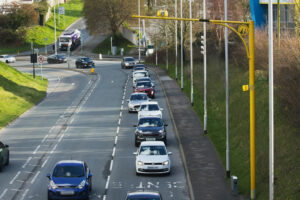A new testing service that will help companies save time and money on new product development before they enter the approval process, has been developed by asphalt testing specialist, R3 Ltd.
Located at Ulster University, R3’s Road Test Machine (RTM) can quickly predict the performance of road material products in the laboratory to help the supply chain mitigate against the risks associated with road trials.
Road trials typically last up to two years during which they are monitored, and a certificate of compliance or non-compliance is then issued to the manufacturer. Although they are extremely important for ensuring products fit-for-purpose are installed on road networks, they can be expensive and time consuming. A manufacturer may have to wait up to two years and incur significant costs before realising that their product cannot be put on the market for certain applications.
The main driver behind product certification assessments in the UK and Europe is the Construction Products Regulations (CPR) implemented in 2013. The CPR allows a manufacturer to give a declaration of performance for a product based on conformity assessments which results in the product receiving a CE marking.
The R3 RTM consists of a 2.1m diameter table that rotates at 10 rpm or 1.1 m/s. Up to ten 305mm x 305mm x 50mm slab specimens or core specimens can be mounted on the table. Two vertically mounted 195/70R14 full-size tyres run freely on the table, applying a load of approximately 5 kN on the test specimens from each tyre and simulating real trafficking.
During testing the tyres track back-and-forth transversely across the width of the test specimen generating extra stressing within the contact patch. The RTM is enclosed in a temperature-controlled room where testing is carried out at 10 ± 2 0 C. The number of rotations and temperature are recorded automatically. The RTM can be programmed to stop after a specified number of rotations. Testing has included the assessment of High Friction Surfacing (HFS) to understand in more details the wear characteristics of HFS systems for BBA HAPAS accreditation.
Dr David Woodward, Chief Scientific Officer at R3 Ltd said: “Understanding what happens during this period of 100,000 wheel passes offers improved insight into time related changes of a product which relate to in-service trafficking conditions. We think we have an ideal solution here to help companies before they spend more money and time on the approval process that despite huge expense over a two-year period, does not guarantee them success.”
The machine can simulate trafficking, which is typically stopped at regular intervals to measure changes in properties such as skid resistance, texture depth, material erosion, retro-reflectivity, tyre/surface enveloping etc. Each test specimen can be photographed or scanned for visual assessment and 3D modelling.
Products intended for use on UK road networks are required to go through certification processes prior to permanent installation. Certification processes typically include the installation of a road trial. They are intended to give confidence that products will meet end-use performance criteria as set out in relevant industry standards, specifications and guidance documents.
The main driver behind product certification assessments in the UK and Europe is the Construction Products Regulations (CPR) implemented in 2013. The CPR allows a manufacturer to give a declaration of performance for a product based on conformity assessments which results in the product receiving a CE marking.
To find out more, read our in-depth article in the forthcoming RSTA Renew magazine, due out in May.
























